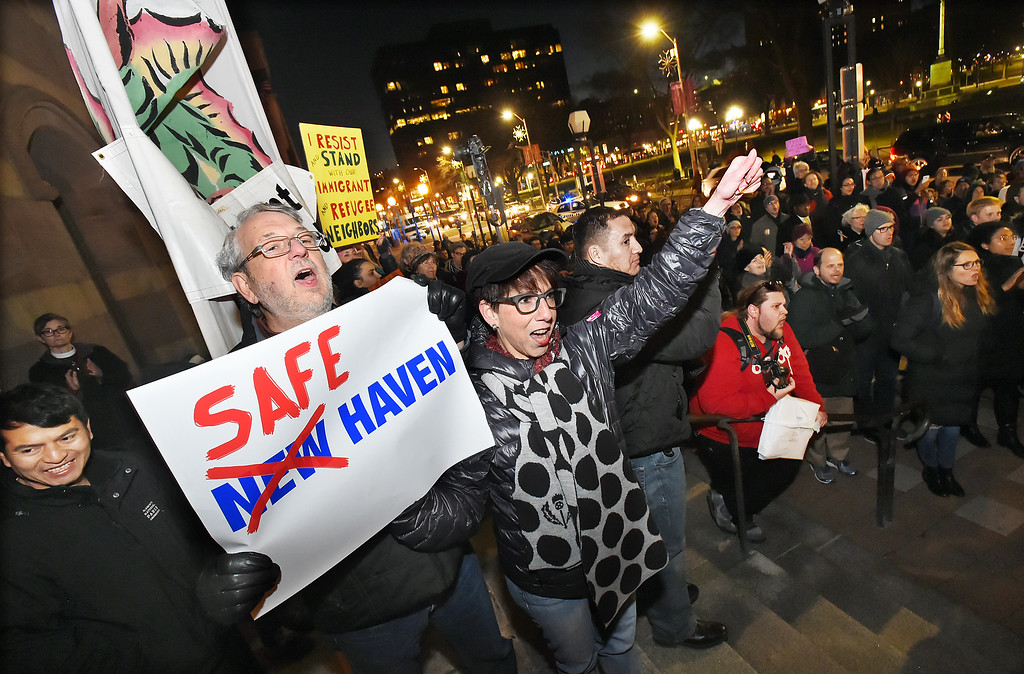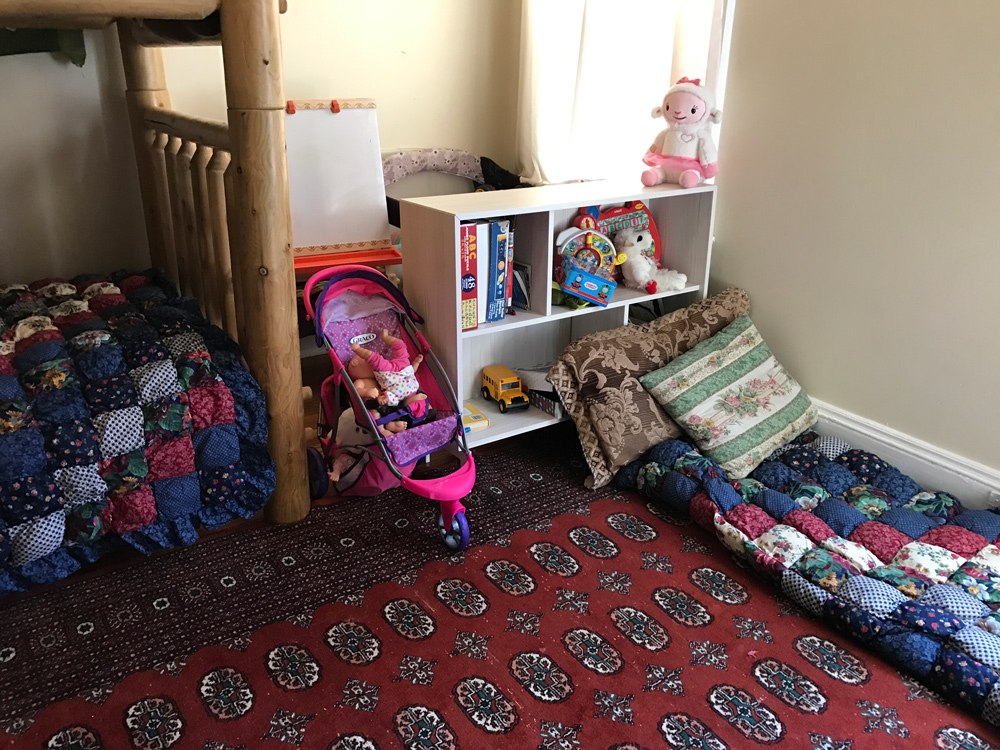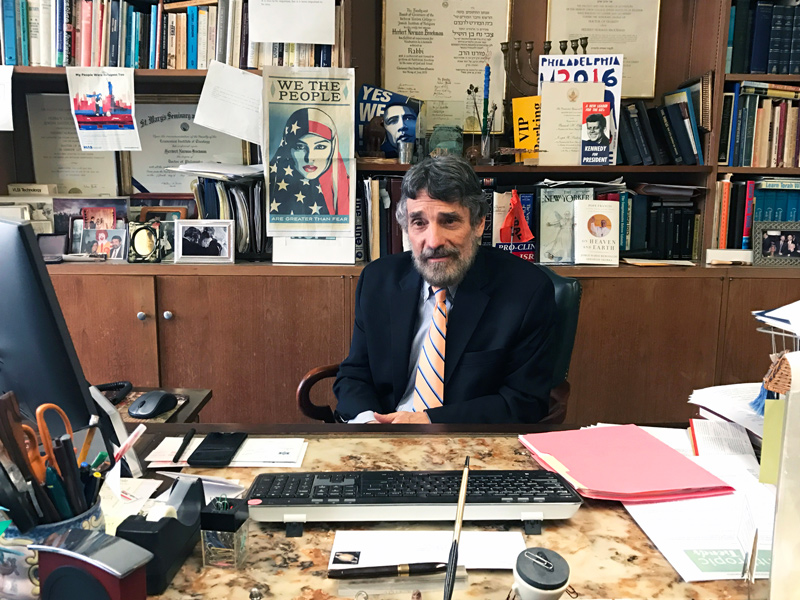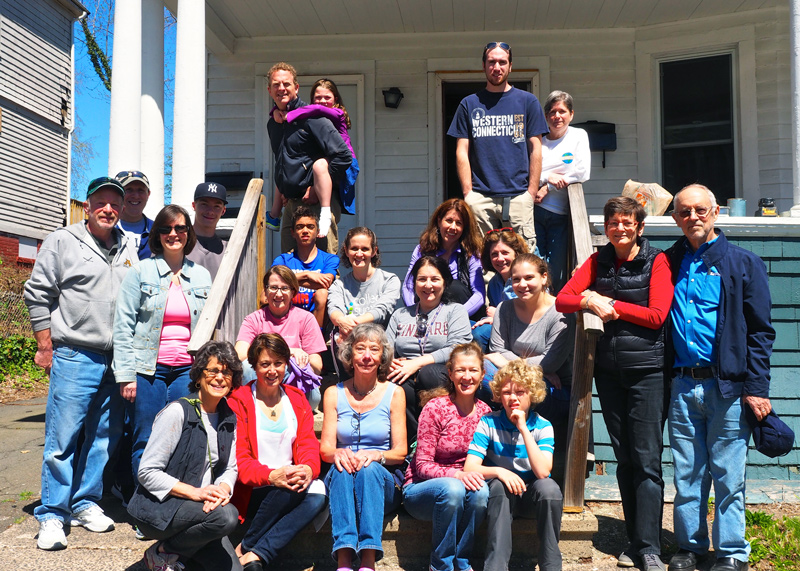Letter From New Haven: A Syrian Family in Trump’s America
On election night, a group of Jews welcomed a Syrian family. Now they wonder what to say when the refugees ask: Will we be safe here?

On November 8, the night she picked up the Syrian refugees, Jean Silk had clear instructions: Show them what they need to know, then leave. No conversation about anything other than lights, heat, food, bathroom, stove. Don’t mention the election.
But Ali and Maya*, with their three young children in tow, didn’t ask. It had been 50 hours since they’d last slept, 16 days since their sponsors had agreed to take them in, four years since they’d fled Syria for Jordan. They were exhausted. Silk and a group of volunteers from New Haven’s Jewish community drove the family to their new home, presented them with a home-cooked Syrian meal and let them sleep.
In the predawn hours, less than 100 miles away, Donald Trump ascended a stage in Manhattan and declared victory. When Silk returned to the house the next day, the Syrian family knew. And on his first morning in America, Ali, 32, who speaks more English than his wife, asked a question: “Are we going to be safe here?”
Silk put her arms out in front of her in a gesture of embrace, a motion she uses when the language barrier is too cumbersome. “You’re safe because you’re with us,” she told him. “In America, one man doesn’t have all the power.”
Silk is the coordinator of Jewish Community Alliance for Refugee Resettlement (JCARR), a coalition of five synagogues that works with the Jewish Federation of Greater New Haven. The group formed in late 2015, after the body of three-year-old Syrian refugee Alan Kurdi washed up on a Turkish beach and the heartbreaking photograph went viral. Members of New Haven’s Jewish community, like many others, felt compelled to act. By the time the group’s first refugee family—from the Democratic Republic of Congo—arrived in April, anti-refugee sentiments were running high.
On the campaign trail, Trump called for a shutdown of Muslims entering the United States “until our country’s representatives can figure out what is going on.” Once in office, he moved to make good on his promise. A draft of the new president’s now-infamous executive order, banning all refugees for 120 days and freezing the arrival of Syrian refugees indefinitely, started circulating on January 25.
For the volunteers, the timing couldn’t have been worse. Their third refugee family, also from Syria, was scheduled to arrive the next day, and they worried that they wouldn’t be allowed to enter the country. But the family arrived as planned, just hours before Trump signed the executive order. And on the family’s first day in America, Silk found herself answering a familiar question: “Are we going to be safe here?”
Three months into their stay, Ali and Maya are still learning to feel safe in New Haven, a city of 130,000. Maya studies English with a tutor for three hours a week, but at 29, she’s finding it arduous to learn a new language. When American visitors come, conversation is halting. She serves tea and coffee and pulls out photos of the feasts she cooked back home. If no men are visiting, she lets her hair, long with dyed-blonde streaks, hang loose.
She wears a hijab in public, and at first she was worried about comments from people on the street. “She was scared,” Ali tells me through a translator. “She wasn’t really willing to go out unless she had somebody else by her side.” Now, she is trying to go out alone more, to look at prices in the grocery store, to ask for help when she needs it. Most of the time, everything goes smoothly. But one day, as she was coming out of Walgreens, a woman looked at her and said: “You, go away. Go home.”

With their sponsors’ help, Ali and Maya decorated their children’s room, carefully arranging books and toys. // © Ellen Wexler
The family’s sponsors are deeply protective, but they know safety is relative. In Syria, when the army conducted a neighborhood roundup after protests in the streets, Ali was beaten and arrested in front of his family. The soldiers demanded that Maya hand over the baby, but she fought back, refusing to let go of her son. The soldiers slashed her arm—Maya still has a scar—but didn’t take the boy.
The family fled to Jordan, where they applied for refugee visas and waited. In the meantime, they welcomed their third child, a daughter. Then came a series of interviews, including two with the United Nations and two with the International Organization for Migration. “The interview was about every little detail you can think,” Ali says. “Private, non-private, life, work, everything.” The results were disappointing: Because Ali had an arrest record, his status was “pending.” He readied himself for more waiting, more screening and more interviews. By the time he boarded a plane to America, he had been in Jordan for four years. “We’ve been treated like criminals, we’ve been investigated, we’ve been looked at differently,” he says. “It’s really hard to finally get the okay.”
Ali and Maya know they are fortunate: Of the world’s 21.3 million refugees, less than 1 percent are ever resettled in third countries, and only a fraction of those make it to America. In fiscal 2016, the U.S. took in a total of 85,000 refugees, 12,587 of them from Syria. Once they arrive, the resettlement process differs from state to state, and certain states, such as Connecticut, are more welcoming than others. In late 2015, when a Syrian family bound for Indiana was turned away by then-governor Mike Pence, Integrated Refugee and Immigration Services, the Connecticut agency that JCARR operates under, took them in. “In moments of trial and tribulation, some people will lead in the wrong direction,” Connecticut Governor Dannel Malloy said at the time. “Hopefully some people will lead in the right direction, and that’s what we’re trying to do in Connecticut.”
Welcoming refugees has always been controversial, but admitting families from Syria has proven particularly unpopular. Nationally, 54 percent of voters say that the U.S. doesn’t have a responsibility to accept Syrian refugees. The backlash is also evident within the New Haven Jewish community, which, like most volunteer groups, does not choose the nationality of refugees they receive. “When I started this job,” Silk says, “I was shocked that there were members of some of these synagogues who were opposed to us working with Syrians.” At one of the synagogues, several members threatened to leave over the congregation’s involvement. Privately, Silk wonders how any Jew could act this way. “I just decided I’m not going to enter into debates with Jews who are opposed to what we’re doing,” she says. “I’m just going to model what I believe.”
For many of the volunteers, refugee resettlement is inextricably linked with Jewish history and tradition. They mention the St. Louis, the ocean liner carrying 900 Jewish refugees that was turned away from U.S. ports in 1939. They talk about pikuach nefesh, the Jewish law that prioritizes saving a life over most other religious commands. But they speak about helping the stranger most of all. “You know, you were strangers in Egypt. Welcome the stranger,” says True Wolff, a volunteer and retired teacher of English as a second language (ESL). “What could be clearer?” Says former Jewish Federation of Greater New Haven CEO Sydney Perry, “You know all the quotes, and all the times that the stranger is mentioned in the Bible? Thirty-six times.”
At the group’s five synagogues, members’ beliefs span the political spectrum, and rabbis struggle with how political they ought to appear. The morning after the election, Herbert Brockman, the rabbi at Congregation Mishkan Israel in Hamden, Connecticut, sent an email to his congregation: We lost, he told them, but in Judaism you get seven days to mourn, and then you get back to work. “The bottom line is people can die,” he says. Speaking from his office, in front of a “We the People” poster with an illustration of a woman wearing a headscarf, he explains that it’s his responsibility to help his congregants perform the mitzvah of saving a life. “It’s a no-brainer—even for a rabbi.”
Michael Farbman, the rabbi at Temple Emanuel in Orange, Connecticut, chooses his words carefully. “I think it’s important to remember that Judaism is Judaism and politics is politics. And sometimes they may intersect, and sometimes maybe not.” He prefers to focus on what happens after refugees arrive rather than the laws that brought them here: “We don’t resettle all refugees, we don’t decide how many we take,” he says. “We are helping resettle legal refugees who arrive in this country. That’s where it begins; that’s where it ends.”

Rabbi Herbert Brockman of Congregation Mishkan Israel in Hamden, Connecticut. // © Ellen Wexler
Ali and Maya’s sponsors are involved in nearly every aspect of their lives. They teach them how to speak English, go shopping, navigate the school system, balance their budgets and schedule doctors’ appointments. Their goal is to make it possible for them to live on their own within six months.
Many of the volunteers have become attached: When Barbara Klein met Maya she felt a bond almost instantly. “There was a warmth and trust that developed so fast,” says Klein. “She’s so joyful. But we can’t talk about real things.” Without a translator, conversations are frustratingly superficial, and so Klein, who co-leads the group’s education team, is now auditing an ESL course and attending a conversational Arabic class.
There are over 100 volunteers like Klein—“100 Jewish mothers,” says Silk. At times, she has to stop some from giving the refugees money and expensive gifts. “I have taken a firm stance that our job is to provide basic necessities, period,” says Silk. “Teach a man to fish, find them a job to be self-sustaining. Showering them with stuff is not necessarily helping them.” The volunteers have long, impassioned conversations about how much the refugees need, how much is inappropriate and where the line is: Is a washing machine a basic necessity? What about a smartphone?
They compare working with refugees to raising children, trying to find a balance between offering help and encouraging independence. But, of course, refugee families are led by adults with complex stories: Some have idealized expectations about life in America and little understanding of how much basic necessities cost in the U.S. Nearly all of them have relatives back home, and they feel obligated to send money when they can. “I keep wanting to find a way to say to Ali’s family: ‘You are poor. You need to understand you are poor,’” Silk says. “I don’t say it that way, but it’s what’s in my head. I repeated to him yesterday: ‘You only have enough money for rent, electricity, gas and food. Nothing else.’”
Eventually, the plan is to find Ali a job so he can support his family. In Syria he worked on air-duct systems and co-owned a family-run telecommunications business. But in America, the barriers are prohibitive: Ali isn’t a fluent English speaker, and he doesn’t have a high school diploma. Nor is he used to an extensive application process. Back home, he says, it was easy. You go to the shops and ask the owner: Do you need a worker?

Jean Silk (seated, first row center) and some of the JCARR sponsors and their families. // Photo courtesy of Jean Silk
Meanwhile, Maya has decorated their new home with handmade curtains, doilies, bouquets of flowers. When her daughter received a perfect attendance award, she attended the celebration at school. Slowly, she is embracing an independence that her sponsors relish. One day, in the car, Ali told Silk, “Maya wants equal with men.” Silk asked, “Is that okay with you, Ali?” He said, “Absolutely.”
Assimilation is a long process, and the couple’s children will be most likely to achieve it. Their two older children, an eight-year-old girl and a nine-year-old boy, were welcomed with letters from their new American classmates. Both still remember their home in Syria, as well as the war. But their two-year-old daughter, born in Jordan, will grow up in America, her story wholly different from her parents’ and siblings’. When I speak with Ali, she is sitting beside him, wearing pink polka dots and playing a game on an iPhone.
Silk and the sponsors are worried about the national political drama playing out over refugees and ponder how it could affect Ali, Maya and the children, as well as their other charges. Even though the January 27 executive order was only in effect for a week before a federal judge put it on hold, the Trump administration promises to enact a Plan B that won’t be as vulnerable to legal challenge. “The news is so much about what my life has become,” Silk says, “and my life has become so much more than it was the day I said I would do this job.”
The sponsors are careful not to discuss their fears with the families, and instead, they debate among themselves how much the refugees understand. Rabbi Farbman wonders: When Ali and Maya asked about their safety, were they reacting to the election results, or could they have been picking up on their sponsors’ anxiety? “We were just all so disoriented,” he says. “It was a very good read of the room.”
Silk disagrees. She finds that Ali and Maya, and the other refugees she works with, are generally well aware of the political climate. In fact, she thinks it likely that, given their personal histories, they had a clearer understanding of what was to come than their American hosts.
*We have changed the names of the refugees interviewed for this story.

4 thoughts on “Letter From New Haven: A Syrian Family in Trump’s America”
I’m sharing like this story because it captures the vulnerability and the choices we have as human beings, the fears and tribal prejudices that haunt our politics, and disables our collective humanity.
Sorry, I’m with Trump on this one. I’ve seen too many stories about what happened with the refugees in Europe (and what happened at San Bernardino, and Boston, etc.) to think that bringing in 50,000 more Alis and Mayas is a good idea. The Organization of the Islamic Conference has 57 member states. Perhaps one of them could step up to the plate and take these folks.
They are safe here as long as they are legally here, blend in, obey our laws, & respect our flag & our freedom. I applaud Maya, for learning English, instead of demanding that we cater to her! In this country, woman are equal to men. No problem with this family. What we & our President have a problem with are terrorists! I realize that vetting may cause them delays in coming here, but in the long run, they will be safer, & so will we!
Bettie, this family already went through a four-year vetting process. I think our State Department did a very good job of vetting them.
Realistically, what more do you want in the way of vetting? What more should we do, how much longer should it take, do you think?